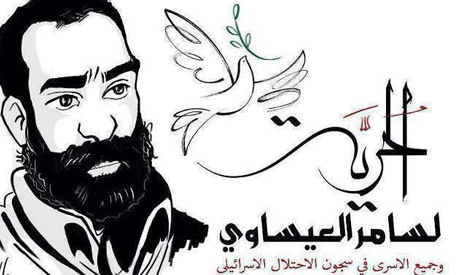
Poster of Palestinian political prisoner Samer Issawi who has been on hunger strike for 233 consecutive days (Photo: Free Samer Issawi Campaign's Facebook page)
The deteriorating health condition of a Palestinian on hunger strike in an Israeli jail, Samer Issawi, is "heartbreaking" says Arab League Secretary-General Nabil El-Arabi.
"I saw a picture of Issawi before and after the hunger strike he started in August 2012 during my last visit to the West Bank; he is in real danger," El-Arabi commented Monday during a conference organised by the American University in Cairo.
El-Arabi says some Palestinian prisoners have spent almost thirty years in Israeli jails but did not commit any specific crimes, which reflects Israel's "violation of all rules and regulations of international law."
The Secretary-General recalls a case of a 10-year-old boy he met during his latest visit to the West Bank and Gaza Strip. "Israel arrests men, boys and women; for them it makes no difference," he noted.
On the bigger picture, the pan-Arab organisation chief praised the UN General Assembly's vote on 29 November 2012 to recognise Palestine as a non-member state, arguing that the international community is currently interested in ending the 65-year Palestinian-Israeli conflict.
"Israel had historically insisted on procrastinating and rejecting all Palestinian demands made during peace talks concerning the refugee crisis, right of return and settlements dilemma," he said.
"Israel cannot claim that the conflict involves disputed territories. By definition of international law, Palestinian lands are now regarded as occupied territories," he argues.
The Free Samer Issawi Facebook page discovered via Shireen Issawi, Samer's sister, that his health status is increasingly deteriorating and he has begun to "weaken significantly," adding that he might lose his life at any moment.
The page details that Issawi is currently under 24-hour surveillance through a device that monitors his heart.
Issawi took his case to court demanding to be released, considering he was never charged with a specific crime, but was rejected. An Israeli magistrate court just last month gave Samer (33) an eight-month jail sentence.
In October 2011, Issawi, then serving the ninth year of a 30-year jail sentence for involvement in resistance activities against Israel, was released as part of an Egypt-brokered prisoner swap between Hamas and Israeli authorities.
That deal led to the release of the highly-publicised case of Israeli soldier Gilad Shalit in exchange for more than 1,000 Palestinian prisoners held in Israeli jails. Issawi was rearrested in July of last year under Israel’s so-called administrative detention law. Issawi has now been on hunger strike for a consecutive 233 days.
The law, which has been in place since the end of the British mandate in Palestine in 1948, allows for the arrest of Palestinians if they are deemed a "threat" to Israel's national security.
The scope of the ongoing hunger strike has posed a new challenge for the Tel Aviv regime, adding fuel to the fire of international criticism for arresting Palestinians and skipping due process of a trial.
Furthermore, Israeli authorities arrested Samer's brother, Shady Issawi, at dawn from his home on 17 February.
"Our heart tonight is with Om [mother of] Ra'fat Samer Issawi, who pleaded to the world earlier today for help to release her son Samer. She sits tonight with her three sons in jail for no other crime than being Palestinian," the campaign statement declared.
"Do not be afraid for my heart if it stops; don’t fear for my hands if they’re paralysed. I am still alive now, and tomorrow, and after death, because Jerusalem is in my blood, in my devotion, and in my faith," Issawi wrote in a message published last month.
Short link: